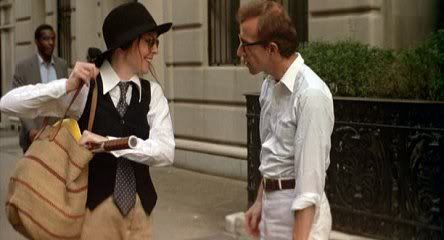My mind tends to jump around a little and I have some trouble between fantasy and reality.

Thirty years ago today, Woody Allen's major breakthrough as a filmmaker came when Annie Hall won the Academy Award for Best Picture of 1977. In fact, it nearly swept all of the major awards that night, with Allen winning Best Director and sharing Best Original Screenplay with Marshall Brickman and Diane Keaton winning Best Actress. The only one it missed was Best Actor, which the Academy decided to bestow upon Richard Dreyfuss for The Goodbye Girl. I guess it was felt that Allen wasn't really "acting" because he was playing "himself." The thing is, this was the first time he was playing a part like this and, for good or ill, it provided the template for many of his performances to come. As far as I'm concerned, I don't care how much of the film is autobiographical and how much the central relationship between Annie Hall and Alvy Singer mirrored the one between Keaton and Allen. All that matters is that it's still funny after three decades and it stands as one of the few comedies the Hollywood establishment ever embraced at Oscar time.

Also up for an award that night was Luis Buñuel's final film, That Obscure Object of Desire, which was nominated for Best Foreign Film, but didn't win. Once again reuniting him with Fernando Rey, who had starred in Viridiana, Tristana and The Discreet Charm of the Bourgeoisie, the film featured Rey as an elderly aristocrat who becomes enamored of his new chambermaid and ends up pursuing her in a masochistic love/hate relationship. Or perhaps I should say he ends up pursuing them because Buñuel plays the trick of having the character played by two different actresses, alternating between them from scene to scene and sometimes shot to shot.
That's not the only surrealist element that he slips in: there's also an unexplained detail about men carrying around burlap sacks and a woman who is discovered carrying a piglet in the park. Then there are the terrorist bombings and other acts of violence that weren't present in the novel, but were incorporated into the script by Buñuel and his collaborator Jean-Claude Carrière to reflect the atmosphere in which it was made. Buñuel may have been deaf in his later years, but he still had his ear to the ground and knew how to keep his films relevant to contemporary audiences. And, of course, this is still the case 30 years later, which is both a testament to his filmmaking skills and a sad reminder that some things haven't changed.